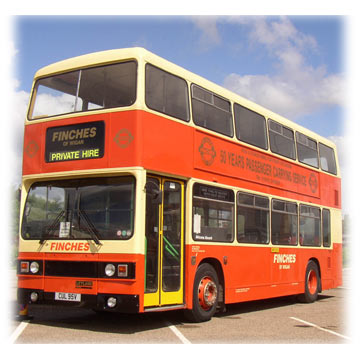The Convenience Bus
How to Reinvigorate Local Bus Services (Page 3)
Contents:
Promotion:
This should be integrated with advertising of each route, or group of routes targeted to each town. For example, a timetable leaflet for local services in Dukinfield could concentrate on promoting the 41, 335, 345, and 346, as well as the longer distance 218, 419 and 343 services. This should include a map of Dukinfield, as well as the times, and any special offers. If frequencies are upgraded and fares are affordable, you have a very marketable product.
Traditionally, the sole place for timetable information was the bus station or transport office. Information on local services should also be freely available in local pubs, convenience stores. At present, local libraries provide access to bus timetables relevant to its area. There is also the Internet, though despite this arrival, people will still pick up a timetable from their bus station or library.
Once more, using the example of the 331/333 services, timetable provision is available at Ashton bus station, and Hurst library. The number of outlets should be extended to include:
- Public houses and social clubs: in a bid to reduce drink driving casualties, pubs should be able to display timetable information of the closest bus to the pub. For example, the Broadoak Hotel could include times of the 331/333, alongside the local taxi firm numbers;
- Supermarkets and convenience Stores: these could include the Late Shop and Food Market Co-op branches in Hurst, as well as local businesses;
- Post offices: at present, there are two post offices on the 331/333 route: Mossley Road and Broadoak Road (the latter opposite the Broadoak Hotel);
- Places of worship: as well as providing current information, church funds could be raised through the recycling of outdated timetables.
Even with the Internet, with timetables available online, and text message bus information from certain points, the low-tech approaches may be just as effective. Few people make dedicated journeys to their local bus station for the sole intention of procuring information, or their desired season ticket. Purchasing a prepaid bus ticket or picking up a timetable is usually part of the shopping list rather than the only item on the list.
Ticketing and Paypoint:
Since February 2006, it has been possible for persons to
purchase System One bus season tickets within Greater Manchester, from
anywhere which has a Paypoint terminal - increasing the coverage area
from the Travelshop to the local off licence or council offices. A
logical progression should be the dissemination of local timetable
information within outlets where Paypoint terminals are available.
Another advantage with Paypoint is that a wider range of payment from cash to debit cards can be used. However, there is one disadvantage with this scheme: new members still have to go to the bus station to join the System One travel club, and provide a passport photo - unlike purchasers of bought on the bus season tickets - such as the FirstWeek (the 331/333 being First Manchester routes).
Micro franchising?
Much noise has been made by some passenger transport executives over route franchising, similar to London. To ensure the convenience bus remains a convenience bus rather than one ran at one's convenience, micro franchising could be considered. These contracts should be tendered either as a route by route, or district basis. Minimum standards could be set to ensure consistency, with parameters set for:
- Bank Holiday and Sunday frequencies: ideally, these should be no less than half the Monday to Saturday frequencies;
- Fleet management: for example, one requirement of routes serving hospitals are that all buses should be low floor;
- Fares: that fare levels should be kept to an easy to remember rate and be affordable;
- Service levels: ideally, no person should be kept too long to the point where walking is a quicker option.
Bank Holiday and Sunday Services:
At present, we have a paradox where despite Sunday trading and increased employment on Bank Holidays, these frequencies have been reduced over the last three decades, despite recent efforts to reverse this, on main routes rather than short distance circular and radial routes.
Where services have a daytime frequency of every half hour or better, Sunday and Bank Holiday services should be at least half the daytime frequency, to boost patronage on these days. For example, the 331, which runs every 20 minutes, would be better served with a 40 minute frequency on Sundays and Bank Holidays, as opposed to every hour at present.
Subject to passenger demand, staff numbers and funding, services on Boxing Day, New Year's Day and even Christmas Day, could run, albeit at 25% of the typical daytime frequency, though with double fares, and discounts for holders of System One or single company season tickets.
Fleet management:
At present, the average convenience bus is a step entrance Dennis Dart. Sometimes this may be an ageing double decker, or middle aged low floor single decker.
Though contemporary step entrance vehicles have lower steps than their predecessors (such as the GMT standard Leyland Atlantean), low floor buses are most desirable for the convenience bus. This is also congruent with thinking reflected in the Disability Discrimination Act. Considering that the local route is the start of most person's journeys to and from work or the shops, their first step should not be steepest.
The ideal bus for epitomising the 'Co-op on Wheels' should include the Optare Solo midibuses, or Wright bodied Dennis Darts, similar to older examples seen on most routes within the Tameside area. Buses could either be owned by the franchisee, or the franchising body, where vehicles could be leased to the operator.
